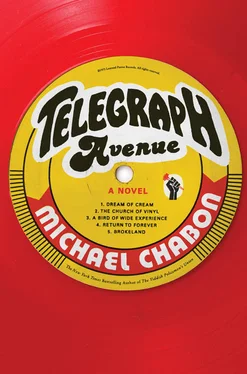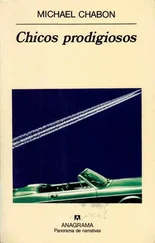The zeppelin disdained his gesture of liberation. It continued to hang, drifting minutely, almost invisibly, three or four feet off the ground.
“Ballast,” Nat inferred. “Right.”
He climbed down the mooring mast, dropped to the ground, and took a slow walk around the gondola, looking for something to release, a system of weights, bags of sand like in The Wizard of Oz. There was nothing. He sat down on the ground, abruptly tired, and looked up at the gondola’s underside. There were two round hydrants, sealed with caps. Modest red capital letters identified them as ballast tanks. Nat reached up, went on the tips of his toes, and got hold of one of the caps. He got just enough purchase on tiptoe to pop it loose. The cap tore loose of his fingers. He felt himself hammered by something cold and implacable that turned out to be a hundred gallons of water. The shock of the water sobered him at once, enough to drench him in an equal or greater quantity of cool, clear regret for what he had done, as the zeppelin, with appalling grace and lightness, took to the luminous night sky.
“How did you get home?”
“Walked. Found a cab.”
“You just left the car there?”
“I now realize the folly of that.”
“That’s how the cops found you. From your registration.”
“No doubt.”
“Oh, Nat.”
“I know, I know.”
“You stole the damn Dogpile blimp.”
“Liberated,” he suggested, but he knew that in all its long history, the word had never sounded more lame.
“Where is it now?”
It occurred to him that a grave and narcissistic fallacy lay at the heart of the fear that he was going to look out the window of his house or Gwen’s car and catch sight of the zeppelin. The zeppelin would not be stalking him. It was mindless, trafficking only with gravity and wind.
“Up in the sky?” he suggested.
“You hope ! Let me ask you a question. When the police called? Can I ask why you did not immediately confess?”
“Panic? Shame?”
“Nat, the thing could crash into the Transamerica Pyramid, the Bay Bridge.”
Privately, Nat wondered if a celebrated giant landmark was more attractive to catastrophe than, say, an egg farm or a Best Buy. “Maybe,” he said, wishful, “it’ll just keep going up. Right on into space.”
They were a few blocks north of MacArthur, and here came Merkata on the left. It was clad in fake half-timbering and stucco with a concrete thatched roof, leftovers from the day, three or four cuisines ago, when it had been a fish-and-chips joint.
“If you want to pull over,” he said, happy to change the subject, “I can go get them.”
“Here they come.”
“Uh-oh. What’s wrong?”
The boys came shuffling out of Merkata like prisoners chained at the ankle. Curtis & Poitier, brothers in woe. Something weighing on them, the burden of captivity, their secret escape plan. Julie clutching that portable eight-track to his chest with a weird, splay-fingered fierceness. Nat got out of the car, remarking the boys’ sheepish and hangdog expressions, wondering if maybe he needed to prepare his angry-dad routine. If he had it in him right now to do that; not to mention, given the events of last night, a moral leg to stand on.
“Julius Lawrence Jaffe, what did you do?”
He was shocked by the influx of his son into his arms. The bony shoulders, the soft lank hair against his cheek. Shocked by the tears that wetted the front of his shirt.
“Pop, I broke my tape player,” Julie said.
Disconsolate. Going slack against Nat like one of those little wooden puppets when you pushed the button in the base.
“It’s okay, buddy,” Nat said. For all the loneliness and anger, for all the stupidity and shame, for all the pain that losing Archy, the store, the vision that Brokeland had always—exactly like Archy said in his eulogy—represented to Nat, with a warrant out for his arrest on a charge of zeppelin rustling, and the possible destruction of the Bay Bridge or, who knew, the Sphinx, the Leaning Tower of Pisa, on his conscience; right then, with his little boy restored sobbing to his embrace, it honestly did feel okay. This was something useful, maybe the sole useful thing, that he still knew how to do. “Let’s go home.”
Julius nodded, then looked up into Nat’s face. “Titus, too?”
“Sure, of course. Titus, you okay? Oh, Jesus, look at you, what happened?”
There was blood on Titus’s face, his shirt collar, and something else staining his shirt. His eyes were wide and shining, about to well over, and his expression was yearning as he watched Julius crumple into Nat’s arms. Standing there, blood on him, no one to hold or be held by. Looking at him, Nat felt ashamed. He opened his arms to make room in the embrace for Titus.
Titus shook his head once, disgusted, cool returned. Then he turned and ran away.
“Titus!” Julie called after him. “Pop, come on! Titus!”
He started to drag himself loose, but Nat held fast, and after a brief struggle, Julie gave up and turned to Gwen in the car, watching them.
“We have to go get him,” Julie said. “Gwen, let’s go.”
“I really don’t think he wants to be around us,” Gwen said. “And I need to go in and talk to these folks about something.”
There was no suff on the menu, but an understanding was reached, and after a brief wait and some blender activity, Gwen was able to allay this unlikely pain at last. She took the tall clear plastic tumbler filled with what Nat understood to be the thin beige milk of roasted sunflower seeds and tipped it to her lips. The joy and sweetness of it on her face, the orgasmic flutter of her eyelids, was stark, arousing.
“Oh, baby,” she said.
But then the weird-looking infusion seemed to go down badly.
“Excuse me,” she said. She put her long and beautiful fingers to her lips, opened her eyes wide, closed them again, and ran to the front door of the restaurant. Out on the sidewalk, she bent double and spasmed, making a sound that Nat would never afterward be able to unhear, a kind of robotic braying, over and over. Nat, an atheist, prayed for it to stop. It sounded like her stomach was tearing itself in two. When she returned, her cheeks and forehead were lustrous with sweat.
“Wow,” she said. She breathed, and swallowed, and breathed again. When she opened her eyes, Julie passed her a napkin, and she dabbed her lips with an improbable daintiness. “Thank you, baby.”
She stood still, scowling, as if listening for something, probing a tooth with her tongue, trying to remember whether she had left a burner lit on the stove at home. And then Nat smelled something that reminded him abruptly of Cochise Jones’s basement. That cheese-cellar whiff, faint as a whisper, of rot. A darker shade of black seeped across the front of Gwen’s stretchy black leggings.
“I’ll be right back,” she said with a chilling show of cheeriness. Her progress toward the bathroom was slow, her waddle exaggerated by the need to keep her legs apart. Behind her, splashes of water marked her passage. When she came out, she had pulled off her leggings and apparently disposed of them. The sight of her bare legs, emerging from the tails of one of Archy’s shirts, came as a shock to Nat. She looked vulnerable, and he understood that she was about to set out for a place, come what may, where she would be completely alone, so much more alone than an existential drama queen like Nat could possibly imagine.
“You need to get me to the hospital,” she said.
With Valletta gone—beyond the reach of X-rays, uplinks, and his unquenchable thirst for an audience—old Luther had lost his defiant aspect. He sat shifting in his chair as if it were greased or electrified, not meeting Archy’s eyes. Eyebrows arching, lips moving, telling Flowers to go fuck himself, saying nothing out loud. A whole great big argument going on there, inside his mind. A knife fight, a televised debate, a sumo match.
Читать дальше
Конец ознакомительного отрывка
Купить книгу












